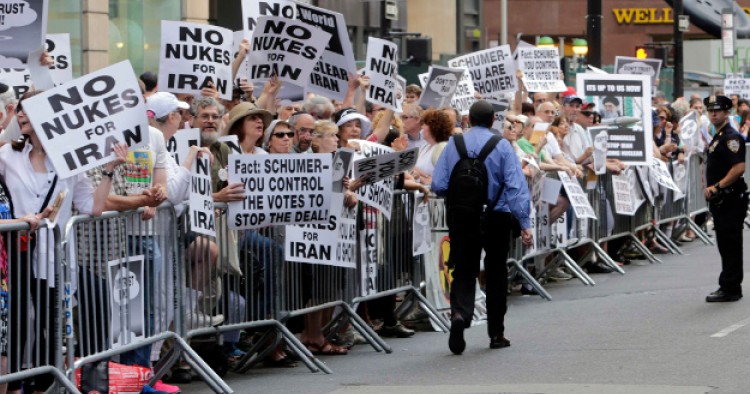This article was first published on Peacefare.net.
Here are some criticisms of the Iran deal that contain at least a kernel of truth; they are worth addressing for the sake of clarifying some of the arguments pro and con.
1. It will give Iran a lot of money to do bad things with. That is true. It’s not as much money as some are claiming; the U.S. Treasury thinks perhaps $50 billion fairly quickly, rather than the $100-150 billion opponents cite. Since the Iranian Revolutionary Guard Corps and its affiliates have lost a great deal (two-thirds of the country’s centrifuges and virtually all of its enriched uranium, not to mention a plutonium-producing reactor filled with concrete), the pressures to compensate it with both money and freedom to exert influence in the region will be enormous. That means more money for shipping arms to Bahrain, Yemen, and above all Syria, as well as compensating Hezbollah for its losses. Only by countering Iranian moves in those places can the United States hope to avoid some of the consequences.
2. All the agreement does is buy time. Yes, that is the main thing it does, by pushing Iran back from a breakout time (the time it needs to procure the fissile material needed to build a singular nuclear weapon) of two months to a year, and preventing any shortening of that breakout time for 10-15 years. But that is not all it does. The verification mechanisms put in place will be the strictest and most comprehensive installed anywhere and will last forever. The obligation Iran takes in the agreement not to pursue nuclear weapons is binding and permanent. The military option so many critics implicitly favor remains open should Iran move in the direction of getting a nuclear weapon.
3. The verification measures are inadequate. It is difficult to prove a negative, as we all know. That is what the verification measures are asked to do. But no country has ever made nuclear weapons in facilities monitored by the International Atomic Energy Agency (IAEA), as Iran’s will be. Iranian facilities will be covered by the tightest monitoring scheme ever devised, with the real capability of detecting diversion of any nuclear material. Still, a clandestine nuclear program is possible, conducted outside monitored facilities. That is why Iranian delivery to the IAEA of answers to questions about its past activities with “possible military dimensions” (PMDs) is so important. That is due October 15, with an IAEA report due December 15. If you want an early indication of whether this agreement will be effective, watch that space.
4. Lifting of sanctions cannot be “snapped back.” Existing contracts will be grandfathered, so the legal impact of any reimposition of sanctions--which can be decided by the United States and its allies over Russian, Chinese, or Iran objections--will not be immediate. But the fact of reimposition will be much more significant than the legal impact. Companies that do business with Iran will immediately dial it down, if not out, should sanctions be reimposed, if only to avoid getting into trouble with U.S. and European financial regulations. In the longer term, Iran will be less vulnerable to sanctions if it invests its money well and is able to develop its oil and especially gas resources. That is an inherent part of the deal.
5. The deal allows industrial-scale nuclear facilities that make Iran a threshold nuclear state. I wouldn’t rank 5,000 or so centrifuges or a few hundred kilos of light enriched uranium as industrial scale or nuclear threshold. But it's fine if you do, because Tehran has much more than that now and would be under no obligation to give any of it up if there is no deal. Are we better off with numbers two and three times as large as will exist if the deal is not approved? Not to mention that without a deal we can expect Iran to accelerate its nuclear efforts.
6. The sanctions will hold even if the United States withdraws from the agreement. It is true that the United States can make life extremely unpleasant for any company or bank anywhere in the world that does business with Iran if Washington says no. But there is a high price to be paid for extraterritorial extension of our sanctions: other governments don’t like it and Iran will build an elaborate network to get around it, as it has with the existing sanctions. Especially on the Repubican side of the aisle, it should be appreciated that anti-market restrictions are unlikely to be watertight or last forever.
7. The arms and especially missile sanctions should not have been lifted. The UN Security Council imposed them in order to get Iran to negotiate on nuclear issues. Iran expected them to be lifted as soon as it had implemented its portion of the nuclear constraints. Instead they will remain in place far longer than we had a right to ask.
I’m reasonably confident that Congress will not muster the 2/3 majority in both houses required to kill the deal. But if they do, we can expect most of the world (that’s everyone but Israeli Prime Minister Benjamin Netanyahu) to think us deranged and to refuse American leadership on Middle East and many other issues for a long time to come. All those Gulf countries complaining about the deal now will make much more noise if the deal falls through and Iran acquires the material for a nuclear weapon in the next couple of months. Remember President Wilson, the League of Nations, and the period between the World Wars? This would be at least as bad.
The Middle East Institute (MEI) is an independent, non-partisan, non-for-profit, educational organization. It does not engage in advocacy and its scholars’ opinions are their own. MEI welcomes financial donations, but retains sole editorial control over its work and its publications reflect only the authors’ views. For a listing of MEI donors, please click here.













